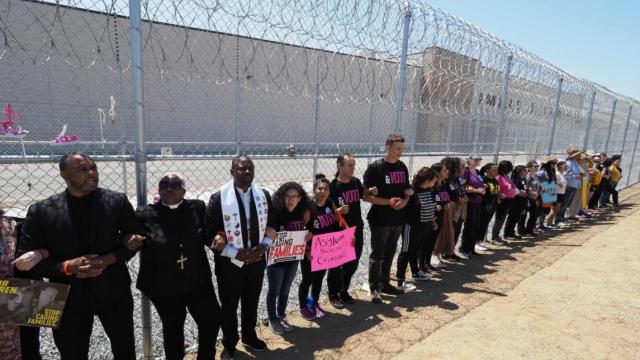
Two private prison companies are facing legal pressure over work programs at detention centers that pay migrants $1 a day to perform tasks such as cleaning or working in the centers’ kitchens.
Recent lawsuits have accused Geo Group Inc. and CoreCivic Inc. of violating federal laws prohibiting forced labor, state minimum-wage laws or unjust-enrichment laws. The companies run detention centers for migrants caught crossing the southern border, detained asking for asylum at an official entry place or accused of living in the U.S. illegally.
Andrew Free, who represents several plaintiffs, said that while prisons can force people convicted of crimes to work, they can’t do the same to people who haven’t been. “The key distinction is because immigration detention is civil in nature,” said Mr. Free. “The people in these places cannot be made to work against their will.”
The companies—the nation’s two largest private prison operators—say the longstanding work programs for migrants are voluntary and are sanctioned by U.S. Immigration and Customs Enforcement.
The $1-a-day rate for immigrant detainees was established by Congress decades ago. ICE’s detention standards say detainees may volunteer for such work to “earn money while confined” and that the resulting “decreased idleness” could ease the “negative impact of confinement.”
CoreCivic spokesman Steve Owen said the company’s voluntary work programs “are consistent with similar programs at other ICE facilities—operated by both public and private entities—and that meet our contractual obligations.”
Geo spokesman Pablo Paez pointed out that the voluntary work program and wage rates were set by the government. “As a service provider to the federal government, Geo is required to abide by these federally mandated standards and congressionally established guidelines,” he said.
The legal challenges gained traction earlier this year when the U.S. Court of Appeals for the 10th Circuit agreed with a lower-court ruling to allow nine immigrant detainees held at Geo Group’s 1,500-bed detention center in Aurora, Colo., to represent a class of about 60,000 others who have been held there in recent years.
Geo Group is appealing the 10th Circuit decision to the Supreme Court. Geo’s attorneys have argued that the company is simply following ICE’s own policies on voluntary work.The Trump administration wants to detain more migrants who have crossed the southern border as it tries to crack down on immigration. The number of migrants in detention while awaiting immigration hearings or deportation has risen to a daily average of 40,000 this year from 34,000 two years ago.
A group of 18 Republican congressman including California’s Rep. Dana Rohrabacher sent a letter to ICE earlier this year, recommending that the agency step in to defend the private prison companies and offer new guidance on the work program to prevent such lawsuits.
“The very goal of the advocates who file these lawsuits is to raise the overall costs of immigration detention in order to discourage its use and diminish the overall level of immigration enforcement in the United States,” the letter said.
Meanwhile, Washington state Attorney General Bob Ferguson, a Democrat, filed a lawsuit last fall against Geo Group over the $1-a-day work program at a detention center in Tacoma, alleging the company is violating the state’s minimum wage laws.
Danielle Bennett, an ICE spokeswoman, said the agency had responded to the letter from the congressmen, but declined to provide the response. Under its detention standards, detainees may volunteer for work assignments but otherwise shouldn’t be required to work except for personal housekeeping, she said.
She declined to comment on the litigation because ICE isn’t a party.
Kevin Landy, former director of the Office of Policy and Planning at ICE under the Obama administration, said private prison companies may pay more than a $1 a day under ICE’s detention standards. He said the low-wage labor keeps the contractors’ operating costs low.
“They are profiting off of it,” said Mr. Landy. “To some extent detention facilities use detainee labor in place of paid employees doing their work.”
According to court filings, Geo said that if it had to pay the detainees minimum wage, it would affect how much it would charge the government.
In a suit filed in April, attorneys allege that Wilhen Barrientos, a Guatemalan man seeking asylum, was threatened with sanctions if he stopped working for $1 to $4 a day as a kitchen laborer at CoreCivic’s 2,000-bed detention center in Lumpkin, Ga.
Mr. Owen, the CoreCivic spokesman, declined to comment on the case, but said that all work programs are voluntary and in compliance with rules for detainee labor.
“We set and deliver the same high standard of care—including three daily meals, access to health care and other everyday living needs—regardless of whether a detainee participates in a voluntary work program,” Mr. Owen said.
In the Aurora case, one detainee, Carlos Ortiz Muñoz, said in court filings that he was forced to clean for no pay while he was held there in 2014 and 2015. Those who refused to work were threatened with solitary confinement, the suit alleges. The suit also attacks the $1-a-day voluntary work program at Aurora for allegedly violating a Colorado law prohibiting unjust enrichment.
During an April earnings call, Geo Chief Executive George Zoley said the lawsuits wouldn’t change the company’s procedures.
“The $1-per-day payment for immigration detention detainees was established by Congress and is stipulated in our contracts,” said Mr. Zoley. Unless a change is made, “we will continue to pay the stipulated amount of $1 per day.”
Originally published by The Wall Street Journal











